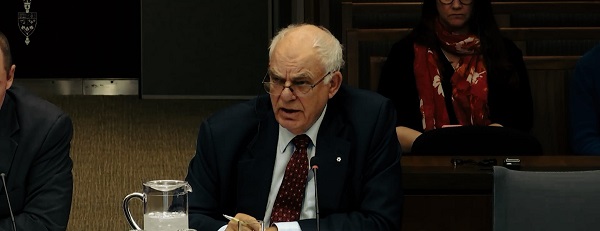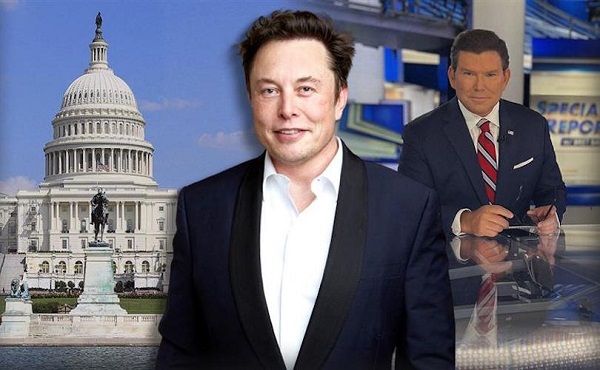Business
Public Accounts Committee Reveals Taxpayer Dollars Funneled to Liberal Insiders with No Accountability

Public Accounts Committee reveals SDTC’s rampant conflicts of interest, lack of oversight, and millions in taxpayer dollars benefiting insiders—while Liberal MPs defend Trudeau’s “green” slush fund.
What happens when politicians promise “green energy” but deliver taxpayer-funded corruption? If you tuned in to Canada’s Public Accounts Committee this week, you found out. On the hot seat was Sustainable Development Technology Canada (SDTC), a bloated agency supposedly designed to fund sustainable technology but apparently also set up as a welfare program for ethically dubious board members.
Now, SDTC isn’t some fledgling startup or small-time charity. This agency is sitting on $330 million of your money – Canadian taxpayer money. And what did Canada’s Auditor General find in her investigation? An unbelievable 186 conflicts of interest. That’s not an organization with a few bad apples; that’s a systematic problem.
So why isn’t anyone doing anything? Here’s where it gets even more outrageous. Enter Ethics Commissioner Konrad von Finkelstein, a man whose entire job is to hold officials accountable for ethical breaches. Did he step up to expose the corruption in SDTC? Not really. Von Finkelstein told the committee that his role is simply to “expose” conflicts of interest, not to actually do anything about them. Think about that. Here’s a man whose salary is funded by taxpayers, and his job description basically amounts to reading out loud the names of people breaking the rules.
Conservative MP Michael Cooper wasn’t having it. Cooper laid it out for von Finkelstein, practically begging him to explain why only two out of dozens of SDTC board members were investigated. But von Finkelstein’s excuse? He couldn’t bother because – get this – the Auditor General had already done the hard work. If that sounds like passing the buck, it’s because it is. Canadians aren’t paying for an Ethics Commissioner to sit back and watch. They’re paying for an official who’s supposed to defend the integrity of public institutions. But that’s clearly not happening here.
Liberal Apologists at Work
Not everyone on the committee wanted answers, though. Some were too busy defending SDTC’s “noble” cause. Liberal MP Nathaniel Erskine-Smith practically bent over backward trying to downplay the whole thing. When Conservative MPs called SDTC a “green slush fund,” Erskine-Smith got indignant. He insisted that SDTC wasn’t a criminal organization and took offense at the term “slush fund.” Really? Because if funneling millions of public dollars into the hands of connected board members isn’t a slush fund, I don’t know what is.
Let’s call it what it is. While Erskine-Smith was busy defending SDTC’s “mission,” the committee heard exactly how that mission was carried out – through unethical, undisclosed conflicts of interest, with board members giving funds to companies they had direct financial ties to. And what did Erskine-Smith call this? Just a “few ethical lapses,” as if millions of taxpayer dollars being handed out without oversight is a minor paperwork error.
The Ethics Commissioner’s Toothless Office
Bloc MP Nathalie Sinclair-Desgagné and NDP MP Richard Cannings pressed von Finkelstein on his office’s glaring lack of oversight. Why was he investigating just two board members when nearly 200 conflicts of interest were flagged? His answer was almost laughable: His office couldn’t enforce anything, couldn’t recoup the wasted money, and couldn’t even stop the bleeding of taxpayer funds because his role is “limited.” Limited? That’s putting it lightly.
And here’s where it gets even more insulting. Von Finkelstein admitted that he wouldn’t coordinate with other agencies like the RCMP or the Auditor General to go after these ethical lapses. This office, which exists solely to enforce ethical standards, can’t or won’t go after those breaking them. It’s as if the Ethics Commissioner’s job is to stand back and announce that something unethical happened, only to shrug and do nothing about it. Can you imagine running any organization that way? Of course not – but in the Canadian government, this seems to be the new normal.
Auditor Testifies, and It’s Worse Than We Thought
Just when we thought the Ethics Commissioner’s testimony had exposed the worst of Canada’s green-tech “accountability” disaster, along comes Auditor General official Michel Bédard. You’d think with the staggering amount of taxpayer money SDTC has under its control, someone would be keeping tabs. But if today’s testimony proved anything, it’s that this agency has zero meaningful oversight, a culture that actively ignores conflicts of interest, and no one stepping in to protect Canadians’ hard-earned money.
So, here we go again. 186 conflicts of interest, millions in public funds granted to companies with ties to board members—SDTC is basically the Wild West of “green” government spending. And guess what? Just like the Ethics Commissioner, Bédard’s office can report on it, but he admitted they can’t actually do anything to stop it. All that money might as well be floating in a pool, with insiders diving in for their share.
The “Accountability” Problem: Michael Cooper’s Pointed Questions
Conservative MP Michael Cooper wasn’t here to play around. He honed in on the obvious question: if SDTC’s board members aren’t held accountable, what’s the point of an Auditor General report? Cooper pushed Bédard to explain why these SDTC board members weren’t facing any real consequences. Bédard’s response? His office doesn’t have the authority to penalize or recover funds—it’s all just for show. That’s the message, folks: this is a government program that “monitors” ethical breaches but has no teeth.
If you’re wondering why SDTC board members feel free to treat taxpayers’ dollars like a bottomless well, this is it. They know that nothing’s going to happen. Cooper hit the nail on the head when he called out the lack of deterrence, and Canadians ought to be asking: why are we funding oversight bodies that can’t actually hold people accountable?
Liberals Try to Soften the Blow—Iqra Khalid’s Flimsy Defense
Then, enter Liberal MP Iqra Khalid, swooping in with damage control. Her goal? To downplay this mess as if it’s all just a big misunderstanding. She floated the idea that SDTC’s ethical violations weren’t “intentional misconduct” but simply lapses in judgment, suggesting board members maybe didn’t “understand” conflict-of-interest rules. Are we supposed to believe that these seasoned board members—handling millions in taxpayer funds—just forgot their ethics training?
Khalid hinted that more “training” and “internal guidance” would fix things. Bédard’s subtle response was telling: yes, training is helpful, but let’s be clear, SDTC’s issues are deeper. It’s a cultural problem within an organization that has no incentive to follow the rules. Training can’t fix a system that fundamentally disregards ethical standards. Khalid’s attempt to sidestep accountability only underscored what’s really happening here—a refusal to impose consequences.
Nathalie Sinclair-Desgagné and Richard Cannings: Why Aren’t Taxpayers Being Compensated?
Bloc Québécois MP Nathalie Sinclair-Desgagné and NDP MP Richard Cannings brought up the most glaring issue yet: where’s the money? Taxpayers are funding SDTC, watching it go straight into the hands of conflicted board members, and yet, there’s no mechanism to get that money back. Sinclair-Desgagné demanded answers on why SDTC couldn’t recoup funds that were misappropriated due to these ethical lapses. Bédard’s response? The Auditor General’s office has no authority to force financial recovery, meaning SDTC’s board can make conflicted decisions with no risk of losing the cash.
Cannings and Sinclair-Desgagné went further, questioning whether anything less than legislative reform could solve this crisis. It was clear that these MPs understood the root of the problem: SDTC’s oversight is built on a house of cards, with taxpayer money at stake and no tools to hold anyone accountable. Canadians are effectively writing blank checks to a board of insiders who profit without consequences.
The Big Picture: A Culture of Entitlement and Zero Accountability
Michel Bédard’s testimony laid bare the sickening entitlement within SDTC’s leadership. This isn’t a minor oversight or an accidental misunderstanding—this is a systemic culture where people with a financial stake in the projects can vote themselves money, and no one bats an eye. Worse, the Liberal defense of SDTC is that because it has a “green mission,” its failures somehow don’t matter. They’re telling Canadians that as long as the organization’s purpose sounds virtuous, the rules don’t apply.
Let’s be real. No one believes that SDTC’s board members are unaware of basic ethics rules. These are people who sit in decision-making positions, who know full well the implications of conflict of interest. What’s happened here is that they’re taking advantage of a system that has no means of holding them accountable, and they know it.
What Canada Needs Now, Real Accountability, Not Empty Promises
The real takeaway from Bédard’s testimony? Canada’s so-called oversight framework is a farce. The Trudeau government has set up an accountability structure that looks good on paper but doesn’t stop the political class from dipping their hands in taxpayer money. If we want to see real change, Canadians need a complete overhaul of the system—one that actually empowers the Auditor General and Ethics Commissioner to take action and enforce consequences, not just to “report” and move on. Until that happens, SDTC will keep doing what it does best: functioning as a de facto slush fund for Trudeau’s elite insiders, where conflicts of interest are not exceptions but the rule.
Canadians deserve far better than a government handing out their tax dollars to political friends who think they’re untouchable. Michel Bédard’s testimony laid bare SDTC’s blatant failures, and it’s a moment of reckoning. Will any of these politicians rise above the corruption and demand real reform? Or will this testimony be just another chapter in the Trudeau government’s long saga of accountability failures?
Let’s get one thing straight: this isn’t about “green energy” or “sustainability.” Those are just fancy words bureaucrats use while they funnel public money to friends and business associates without a shred of oversight. And here’s the kicker—Liberal MPs want Canadians to think this is just a “misunderstanding” or, worse, that questioning it is somehow unpatriotic. It’s the Trudeau swamp at its finest: shut down accountability by slapping a green label on taxpayer-funded corruption and hoping no one notices.
Let’s face it: Sustainable Development Technology Canada isn’t operating in some dark corner of bureaucracy. It’s operating right out in the open, with the full backing of Trudeau’s government, while the Ethics Commissioner, the Auditor General, and Liberal MPs play the role of political apologists, doing everything they can to sweep this rot under the rug.
This committee session showed Canadians one thing loud and clear: they’re being lied to. Told that their money is supporting green technology, but instead, it’s being pocketed by insiders. SDTC, the Ethics Commissioner, the Auditor General—they’re not protecting Canadians. They’re protecting the interests of a political class that’s putting cronyism above the public good.
In a fair system, people would lose their jobs over this. Taxpayer money would be repaid. And those who let SDTC slip through the cracks would face consequences. But in Trudeau’s Canada, officials hide behind excuses, Ethics Commissioners wring their hands about “exposure,” and Liberal MPs get offended when we dare call corruption for what it is.
This isn’t “oversight.” It’s an insult to every Canadian who funds this government. It’s time to drain the Trudeau swamp, end the era of unchecked cronyism, and demand real, accountable governance. Canadians deserve nothing less.
Subscribe to The Opposition with Dan Knight .
Business
Labor Department cancels “America Last” spending spree spanning five continents

 MxM News
MxM News
Quick Hit:
The U.S. Department of Labor has scrapped nearly $600 million in foreign aid grants, including $10 million aimed at promoting “gender equity in the Mexican workplace.”
Key Details:
-
Labor Secretary Lori Chavez-DeRemer and Deputy Secretary Keith Sonderling were credited with delivering $237 million in savings through the latest round of canceled programs.
-
Among the defunded initiatives: $12.2 million for “worker empowerment” efforts in South America, $6.25 million to improve labor rights in Central American agriculture, and $5 million to promote women’s workplace participation in West Africa.
-
The Department of Government Efficiency described the cuts as necessary to realign U.S. labor policy with national interests and applauded the elimination of all 69 international grants managed by the Bureau of International Labor Affairs.
Diving Deeper:
The U.S. Department of Labor on Wednesday canceled $577 million in foreign aid grants, including a controversial $10 million program aimed at promoting “gender equity in the Mexican workplace,” according to documents obtained by The Washington Post. The sweeping decision to terminate all 69 active international labor grants comes as part of a larger restructuring effort led by John Clark, a senior DOL official appointed during the Trump administration.
Clark directed the department’s Bureau of International Labor Affairs (ILAB) to shut down its entire grant portfolio, citing a “lack of alignment with agency priorities and national interest.” The memo explaining the cancellations was first reported by The Washington Post and highlights a broader shift in federal labor policy toward domestic-focused initiatives.
Among the eliminated grants were high-dollar projects that had drawn criticism from watchdog groups for years. These included $12.2 million designated for “worker empowerment in South America,” $6.25 million targeting labor conditions in Honduras, Guatemala, and El Salvador, and $5 million to elevate women’s workplace participation in West Africa. Other defunded programs involved $4.3 million to support foreign migrant workers in Malaysia, $3 million to improve social protections for internal migrants in Bangladesh, and $3 million to promote “safe and inclusive work environments” in Lesotho.
The Department of Government Efficiency, also involved in the review, labeled the grants as “America Last” initiatives, and pointed to the lack of measurable outcomes and limited benefits to American workers. The agency commended the leadership of Labor Secretary Lori Chavez-DeRemer and Deputy Secretary Keith Sonderling for securing $237 million in savings during this round alone.
The cuts mark the second major cost-saving move under Chavez-DeRemer’s leadership in as many weeks. Just days earlier, she canceled an additional $33 million in funding, including a $1.5 million grant focused on increasing transparency in Uzbekistan’s cotton sector. Chavez-DeRemer, a former Republican congresswoman from Oregon, was confirmed as Labor Secretary on March 11th by a bipartisan Senate vote of 67-32.
Business
Elon Musk, DOGE officials reveal ‘astonishing’ government waste, fraud in viral interview

From LifeSiteNews
Elon Musk said that ‘the sheer amount of waste and fraud’ in federal agencies, is ‘astonishing’ and that DOGE is cutting ‘$4 billion a day’ in misused taxpayer funds.
In a remarkable Fox News interview, Department of Government Efficiency (DOGE) founder Elon Musk and top officials of the DOGE team offered stunning, often infuriating, insights into how the federal government functions.
The interview, which has garnered well over 10 million online views on X in less than 24 hours, provided one extreme example after another of government mismanagement, excess, waste, and fraud while simultaneously promising a future where the D.C. Leviathan is tamed and restored to its proper, efficient role.
The new Deputy Director of the Office of Management and Budget (OMB), former U.S. House Rep. Dan Bishop, averred that the DOGE A-Team interview was the “most amazing and significant half-hour in TV history.”
Musk was joined by DOGE team members Steve Davis, Joe Gebbia, Aram Moghaddassi, Brad Smith, Anthony Armstrong, Tom Krause, and Tyler Hassen – all successful businessmen and entrepreneurs in their own rights – to describe the widespread systemic weaknesses and failures at the Internal Revenue Service (IRS), the National Institutes of Health (NIH), the Department of Health and Human Services (HHS), the Social Security Administration (SSA), and more.
Fox host Bret Baier described the group as “Silicon Valley colliding with government.”
“This is a revolution. And I think it might be the biggest revolution in government since the original revolution,” said Musk during the discussion.
“But at the end of the day, America’s going to be in much better shape,” he promised.
“America will be solvent. The critical programs that people depend upon will work, and it’s going to be a fantastic future.”
My interview with the @elonmusk and the @DOGE team tonight on #SpecialReport pic.twitter.com/KKpxEPtu1Z
— Bret Baier (@BretBaier) March 27, 2025
“The government is not efficient, and there’s a lot of waste and fraud. So we feel confident that a 15% reduction can be done without affecting any of the critical government services,” began Musk, founder and CEO of both Tesla and SpaceX and owner of X.
Musk said that the most stunning thing he’s discovered during the early phases of DOGE is “the sheer amount of waste and fraud in government. It is astonishing. It’s mind-blowing.”
Musk cited the example of a simple 10-question National Park online survey for which the government was charged nearly $1 billion and which in the end served no purpose.
“I think we will accomplish most of the work required to reduce the deficit by a trillion dollars within [130 days],” he predicted. “Our goal is to reduce the waste and fraud by $4 billion a day, every day, seven days a week. And so far, we are succeeding.”
Billionaire Airbnb co-founder Joe Gebbia, is working to digitize the retirement process for government employees, which is currently stuck using 1950s technology, housed in a Pennsylvania cave.
“It’s an injustice to civil servants who are subjected to these processes that are older than the age of half the people watching the show tonight,” said Gebbia. “We really believe that the government can have an Apple store-like experience, beautifully designed, great user experience, modern systems.”
“The retirement process is all by paper, literally, with people carrying paper and manila envelopes into this gigantic mine,” added Musk, limiting the number of federal employees who can retire to no more than 8,000 per month.
Gebbia expects to have the antiquated system updated and overhauled in a matter of months.
“The two improvements that we’re trying to make to Social Security are helping people that legitimately get benefits protect them from fraud that they experience every day on a routine basis and also make the experience better,” said DOGE software engineer Aram Moghaddassi.
He offered an amazing statistic: “When you want to change your (direct deposit) bank account, you can call Social Security. We learned 40% of the phone calls that they get are from fraudsters” who are attempting to commandeer retired seniors’ benefit payments.
“What we’re doing will help their benefits,” assured Musk. “As a result of the work of DOGE, legitimate recipients of social security will receive more money, not less money.”
“There are over 15 million people that are over the age of 120 that are marked as alive in the Social Security system,” said Steve Davis, who has previously worked alongside Musk at SpaceX, the Boring Company, and X
He explained that despite this being discovered by hardworking personnel at the SSA back in 2008, nothing was done. As a result, 15-20 million social security numbers that were clearly fraudulent were just floating around, susceptible to being used for “bad intentions.”
Health care entrepreneur Brad Smith, who has taken charge of auditing HHS and NIH, also cited stunning, troubling statistics displaying the extreme inefficiencies of the nation’s top federal health organizations.
Smith said that at NIH, “Today they have 27 different centers” created by Congress over the years and there are “700 different IT systems,” each using their own IT software.
“They have 27 different CIOs (Chief Information Officers),” added Smith, “so when you think about making great medical discoveries, you have to connect the data.”
Those discoveries are likely severely hampered by NIH’s communications disconnect.
Anthony Armstrong, a Morgan Stanley banker now working for DOGE at the Office of Personnel Management (OPM) talked about “duplicative functions” and “overstaffing” at government agencies. He said that money is “sloshing out the door.”
As an example, he cited the IRS, which has 1,400 employees whose only job is to provision laptops and cell phones to IRS workers.
“As an ex-CFO of a big public tech company, really what we’re doing is, we’re applying public company standards to the federal government, and it is alarming how the financial operations and financial management is set up today,” said Tom Krause, CEO of Cloud Software Group.
He explained that there is virtually no accountability or verification protections when it comes to the Treasury Department disbursing funds to various government agencies.
A 94-year-old grandmother is no longer “going to be robbed by forces like she’s getting robbed today, and the solvency of the federal government will ensure that she continues to receive those social security checks,” added Musk.
“The reason we’re doing this is because if we don’t do it, America is going to go insolvent and go bankrupt, and nobody’s going to get anything,” said Musk.
Tyler Hassen, a former oil executive working at the Interior Department for DOGE alleged that there was no departmental oversight at the Interior Department “whatsoever” under the Biden administration.
Steve Davis talked about the out-of-control issuance and use of federal credit cards.
“There are in the federal government around 4.6 million credit cards for around 2.3 to 2.4 million employees. This doesn’t make sense. So, one of the things all of the teams have worked on is we’ve worked for the agencies and said, ‘Do you need all of these credit cards? Are they being used? Can you tell us physically where they are?’” recounted Davis.
“Clearly there should not be more credit cards than there are people,” interjected Musk.
Musk later described how the Small Business Administration (SBA) has given out $300 million in loans to people “under the age of 11.” An additional $300 million in loans has been handed out to people “over the age of 120.”
Musk said that these government loans are clearly “fraudulent.”
“Terrible things are being done,” he exclaimed. “We’re stopping it.”
-

 Alberta2 days ago
Alberta2 days agoAlberta Institute urging Premier Smith to follow Saskatchewan and drop Industrial Carbon Tax
-

 Addictions2 days ago
Addictions2 days agoShould fentanyl dealers face manslaughter charges for fatal overdoses?
-

 2025 Federal Election2 days ago
2025 Federal Election2 days agoFool Me Once: The Cost of Carney–Trudeau Tax Games
-

 Alberta2 days ago
Alberta2 days agoAlbertans have contributed $53.6 billion to the retirement of Canadians in other provinces
-

 Also Interesting1 day ago
Also Interesting1 day agoThe bizarre story of Taro Tsujimoto
-

 Health18 hours ago
Health18 hours agoRFK Jr. Drops Stunning Vaccine Announcement
-

 2025 Federal Election2 days ago
2025 Federal Election2 days agoChinese Gangs Dominate Canada: Why Will Voters Give Liberals Another Term?
-

 J.D. Tuccille19 hours ago
J.D. Tuccille19 hours agoSignal Chat Controversy Is an Endorsement of Encryption Software








